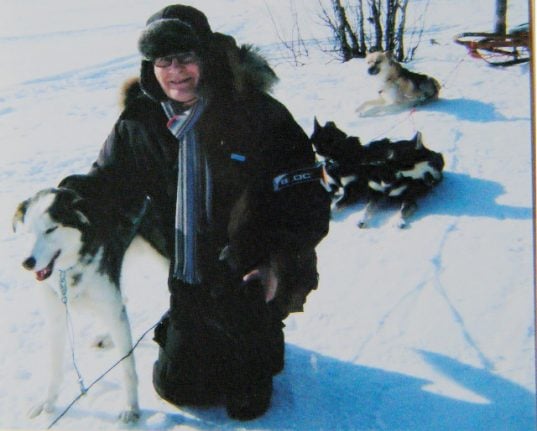Porecky is someone with a genuinely international background. Of Polish origin but born and raised in the UK, the Englishman also served in the British Army in Nigeria, so he has seen a lot of the world. It was in Sweden, however, that he found the inspiration for his books:
“I would find it really difficult to write anything set in the UK, because Sweden is just such a wonderful place and I'm very much an outdoor man. The forest, the lakes, it had to be about that.”
So how exactly did the Brit come to Sweden in the first place? That story is a familiar one.
“I came to Sweden because, well, is there any other reason? I fell in love with a Swede,” he laughs.
“I went over to Sweden and married her. And that's a very long time ago, more than 50 years. So, that gave me all the contacts I needed and I got help with the language. We've been tied to Sweden ever since. Now one of our children, and our grandchildren are there.”
Since he was a child Porecky has always had a big imagination, but he didn't find the time to focus on his writing until he retired in 1990. Then, all he needed was the ideal place to get inspired, and Sweden provided it.
“Once I started writing we got a 'sommarstuga', a Swedish summer cottage, up in the north, up in Jämtland. That’s where I wrote and that's where I was doing all my novels.”
A photo Porecky took of a valley in Indal, Sundsvall. Photo: Robin Porecky
The Swedish inspiration worked: Porecky's first novel, “A Pathless Land”, was longlisted for the Authors Club Best First Novel Award in 2010. Once he had his second book under his belt, he decided to focus on crime stories set in the place he was drawing inspiration from.
“My agent persuaded me to move from historical novels, which the first two were, to Swedish crime writing,” he notes. As a result, Porecky created Swedish inspector Magnus Trygg, the main character of his five following books.
What sets the Magnus Trygg series apart from other Swedish crime novels according to Porecky is the hero's unique perspective. “I made him half Thai and half Swedish. So he himself has a different viewpoint, which I felt might be a good thing, because I also have, as I suppose, a half English half Swedish view point,” he says.
The Brit's international history is particularly apparent in the latest book of the Magnus Trygg series, Benin Bronze, where the story links Sweden with Africa.
“I spent quite a lot of time in parts of Africa, Nigeria and what was then the Gold Coast (now Ghana). I'm a military man, I was in the army, so I had a huge amount of experience of all that sort of things. So, the book starts off in Nigeria and the Gold Coast, in colonial times, and then it has something nasty happening in Sweden, which can tie into it.”
Preparation is particularly important for the author when writing his books. With his first novel, the research phase gave him a reason to explore the northern parts of Scandinavia, Lapland, or as it is known in the native Sami language, Sápmi.
“I went up there and I walked all over the parts I was going to use, so that every step the characters took, every suffering step, I've taken as well. And I did that with all my books. If it was going to be, as in the last one, a murder at a lake, I'll go and walk all round this lake and fish there and find out everything about it and the roads that lead to it,” he reveals.
A poster advertising one of Porecky's Magnus Trygg books in Bispsgården, Sweden. Photo: Robin Porecky
Porecky's love of nature is not only apparent in his books. His other passion is making knives, something he would also do at his beloved summer cottage in Jämtland:
“I made about 34 knives and every single one of them was utterly different. People who wanted a knife could come to me. In one case, they came and actually chose the tree, from which I would cut the wood from a year later.”
Benin Bronze is currently being considered from the Crime Writers Association International Gold Dagger Award, and it seems the author has decided to go out on a high note. After tying up the story of his Swedish inspector Trygg in the last part of the series, Porecky now has no plans for a further book.
“It’s sad really. But I brought it to an end and it gets harder when you get older. I was trying to bring out one a year and I achieved that over seven books. I think probably that'll be it.”
One of his few regrets is that the Trygg series is not better known in Sweden, he bemoans, but his love of Sweden continues regardless:
“I'm still spending some time in Sweden, with my family there and my wife wanting to go back, we are all across Sweden anyway,” he notes.
Looking back at his experience as an author, he encourages anyone considering writing to give it a try.
“What I would say is: always go for it, just do it! Don't panic, just get a pen, start writing and keep going! You probably have to throw it all away and start again, do that several times and lose a lot of it, but in the end, you will get there!”
And if all else fails, sitting in a lovely sommarstuga in Sweden helps when it comes to finding inspiration, he concludes.
Article written by The Local contributor Christian Krug.



 Please whitelist us to continue reading.
Please whitelist us to continue reading.